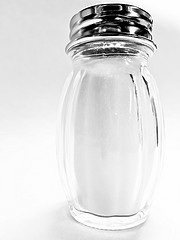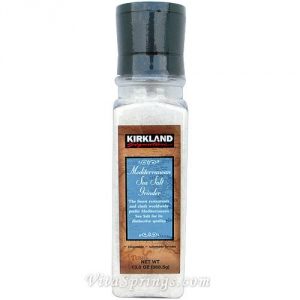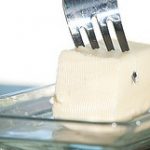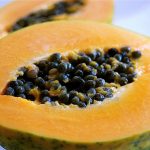 One of the major politically-correct nutritional trends a Real Foodie learns to ignore is the idea that salt is bad for you. Why?
One of the major politically-correct nutritional trends a Real Foodie learns to ignore is the idea that salt is bad for you. Why?
The nutritional notion from the “experts” that the sodium in salt causes hypertension, or high blood pressure, has been drilled into our heads for years. And what health problems does hypertension pose? Potentially fatal cardiovascular events such as heart attacks. Yikes!
So, ditch the salt then, right? Not so fast.
It’s a big mistake to consider “salt” and “sodium” one and the same. If we’re looking at your run-of-the-mill, stark white and finely ground powder in your average table salt shaker, we see a substance consisting of only two chemical minerals — sodium and chloride. This is the stuff widely used in fake, processed foods in staggering quantities. It is an equally fake, highly-processed product that doesn’t even come close to resembling the earthly-born matter that it originated as — that is, salt from the sea. And it does pose health risks, as do any fake foods!
The fact remains, however, that salt is a necessary component to healthy functioning of our bodies. We need it for:
- Regulating blood sugar
- Proper hydration retention
- Thyroid functioning
- Adrenal functioning
- Protein and carbohydrate digestion
- Brain development and function
- Muscle contraction and expansion
- Nerve stimulation
You know the commonly-touted fact that your body is over [insert number indicative of a vast majority] percent water? That “water” is not solely replenished by downing bottles of tap water “purified” by Coca-Cola (as much as they would like you to believe). Actually, the composition of water in a healthy body is more akin to the salt water of the ocean. Obviously, the salt’s in there for a reason.
So why, then, is processed table salt (NaCl) unhealthful?
As mentioned earlier, common table salt is essentially nothing more than sodium and chloride (okay, 97.5%, the other 2.5% being chemical additives!), which are but two of usually over 50 healthfully-balanced minerals found in real, natural salt from the sea. They strip that salt down to bare-bones sodium chloride (with the use of heavy metals such as aluminum, leaving toxic traces in the final product, as well as anti-caking chemicals and bleach), and sell the rest for parts, essentially. This is why processing everything to death is profitable — you can make more money selling all the little bits and pieces of a food from the earth, than you can by selling the whole food itself. Healthy for big food corporations’ pocketbooks, unhealthy for us.
Being left with an overdose of sodium chloride and a deficit of many other minerals crucial to your health (oh, except iodine — they go ahead and throw that back in so you don’t get GOITERS — never mind what the absence of other essential minerals does to you!), the use of common table salt in your diet is risky to your health, if for no other reason than by using the fake stuff instead of the real, you deprive your body of those vital minerals found in natural salt.
Matters of the Heart
However, let’s get back to the issue of sodium consumption as it relates to cardiovascular health. The assumption that higher levels of sodium intake can cause hypertension is misguided — blood pressure is more affected by an imbalance of nutrients in relation to sodium — including calcium, phosphorous, and potassium.
Recent studies show that the previously-held claim that hypertension is caused by sodium consumption is untrue, however, for those already suffering from hypertension (likely from excessive fructose consumption), a diet unnaturally high in sodium (found in unnatural sodium chloride) can worsen the issue. This is because excessive sodium can cause cause blood vessels to retain excessive amounts of water, creating an increase in pressure along the arterial walls, and making the heart work harder than it should. Incidentally, a diet too low in sodium has been linked to higher incidences of heart attack!
The key here, obviously, is balance. If you avoid an abundance of highly-processed, highly-salted foods (especially fast food!) containing unhealthy levels of sodium chloride, and stick to eating REAL, whole foods, you greatly reduce your risk of overdoing it on the sodium, missing out on the proper balance of nutrients, and the possible negative health consequences that can result. Replacing that chemically-altered salt used in your home cooking with real, whole salt is a great place to start!
But is buying “Sea Salt” the answer?
Yes and no.
As much as “sea salt” has become the trend for the savvier salt consumer, not all sea salts are what their labels might lead you to believe. Just as there are no regulations as to what products a company can label “all natural,” there’s nothing stopping them from calling any salt product they want, “sea salt” — because the “sea” is where all the salt technically originates from, even the fake stuff.
 For example, this deceptively-labeled product I bought not too long ago, totally fooled me! “Mediterranean Sea Salt.” Ahh… how exotic! Except the biggest difference between it and your everyday Morton’s, is that it comes in larger, refined chunks — mineral depletion still accomplished.
For example, this deceptively-labeled product I bought not too long ago, totally fooled me! “Mediterranean Sea Salt.” Ahh… how exotic! Except the biggest difference between it and your everyday Morton’s, is that it comes in larger, refined chunks — mineral depletion still accomplished.
What you want to avoid is anything WHITE. This indicates bleaching, and other chemical processes used to strip away 90% of the naturally-occurring minerals within the salt.
Salt from Mother Nature is COLORFUL! Look for shades of gray, red, brown, black, even pink in your salt. These luscious colors are indicative of the many wonderfully beneficial trace minerals found in abundance in salt that comes from the sea and is naturally dried by the sun. Tasty!
Some great types of natural sea salts include Redmond’s Real Salt(found in many regular ol’ grocery stores), Himalayan sea salt
, Celtic sea salt
, and (hooray!) Hawaiian black lava
, or Hawaiian Alaea salt
found right here in my backyard! The brands and products I linked to are just some of the ones you might find to supply your home these quality salts. Feel free to let me know of any other good ones, and happy salting!
Sources:
Nourishing Traditions, Sally Fallon and Dr. Mary Enig, Ph.D.
http://www.fitday.com/fitness-articles/nutrition/healthy-eating/myth-or-fact-salt-increases-blood-pressure.html
http://www.alkalizeforhealth.net/Lsalt.htm
http://www.refinediodisedsaltplant.com/process.html
http://articles.mercola.com/sites/articles/archive/2003/07/30/sodium-recommendations-part-two.aspx





Great goods from you, man. I have take note your stuff previous to and you are simply too wonderful. I actually like what you’ve acquired right here, certainly like what you’re stating and the best way during which you assert it. You make it entertaining and you still care for to keep it smart. I cant wait to learn much more from you. This is really a terrific site.
I have recently noticed now that the “sea” salt currently carried by Kirkland Corporation is from Brazil and it is not in chunks to grind. Since I changed from “regular”, Cargill “road” table salt to the supposedly “un” sea salt that KC sells, I have noticed that there is a less saltier taste to it.
I try to eat as much food in its natural, organic and, if it is labeled, non gmo form as possible but overall, I use very little salt as it is. Mostly in my bread baking which accounts for 2 1/2 teaspoons per 2 loaves of home baked bread. Not because I’m avoiding it for any health reason. It’s what the recipe calls for.
I do make my own mayo by using lemon juice, grapeseed oil and egg whites. No yolks. Never been much of an egg fan and the yolks are where the cholesterol is anyhow. I have genetically inherited high cholesterol and absolutely refuse to take the meds for it. My 86 year old dad is a string bean and has high cholesterol.
Having a good old fashioned cookbook where literally EVERY recipe in it is from scratch is handy to have also. Very few of them anymore. Very few people even COOK anymore, there is so much prepared food.
So true that so few people actually cook these days! Those old cookbooks are so great, like the Joy of Cooking? Gotta get myself a copy of that.
Funny that you mentioned making your own mayo — I’m in the middle of writing a post about that! Although, I just thought I’d point out that the cholesterol in the yolks is surprisingly one of the many beneficial nutrients in the yellow stuff! Here is an awesome article by another real food blogger who is actually also a practicing nutritionist, that explains a lot about why cholesterol isn’t quite the horribly unhealthy substance we’ve always been told: http://realfoodforager.com/2011/07/5-reasons-to-love-cholesterol-2/
Pretty interesting stuff! So smart of you to avoid those statin drugs, too, by the way.
Thank you for pointing out that real salt is not white. That the typical American table salt is bleached.
I find it pretty incredulous that to see two large public health agencies going toe to toe over published findings. In this article the American Journal of Hypertension claims salt is safe in regards to hypertension just to be countered by the American Heart Association questioning the study’s findings.
http://www.dailyrx.com/news-article/american-heart-association-recommends-reduced-sodium-intake-manage-high-blood-pressure-
It seems like more evidence to follow the money trail.